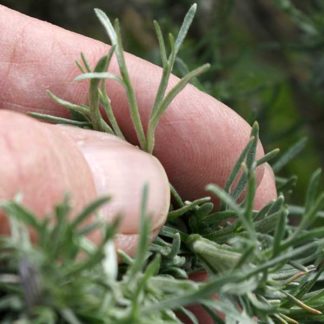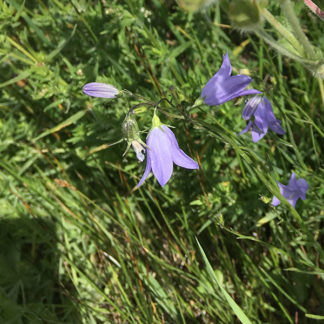drought tolerant
Showing 13–24 of 115 results
-

Artemisia ludoviciana / white sage
- low, spreading perennial - up to 3 feet tall
- silvery leaves and stems (hairy)
- leaves lance shaped, but sometimes lobed
- shoots die back in winter
- aromatic
-

Artemisia rigida / stiff sagebrush
- low growing deciduous shrub
- short, 3-5 lobed, grey leaves (hairy)
- mild to pungently aromatic leaves
- brittle branches up to 16 inches long
-

Artemisia tridentata / mountain big sagebrush
- medium-sized grey-green shrub
- highly aromatic
- tall, spikey inflorescences with many clusters of invisible flowers
- limited to drier habitats (not the Valley basin)
-

Artemisia tripartita / threetip sagebrush
- evergreen shrub; branches in broom-like clusters
- all parts covered with silvery/grey-green glandular hairs
- leaves long and very deeply, very distinctly 3-lobed
- flowers in spikes/racemes - all bits teeny, overall yellow-ish/reddish
- often with mountain big sagebrush on nutrient poor soils
-

Astragalus purshii / woollypod milkvetch
- low growing, silvery, compound leaves; no tendrils
- magenta (or white) "pea-like" flowers with darker keel petal
- "congested" inflorescence
- found in very dry areas, not in shade
-

Balsamorhiza macrophylla / cutleaf balsamroot
- large, yellow, sunflower-like blossom
- large, dissected/lobed/compound-looking leaves
- up to 40" tall
- roadsides or hillsides with arrowleaf balsamroot and Wyethia
-

Balsamorhiza sagittata / arrowleaf balsamroot
- large, bright yellow, sunflower-like blossoms in early spring
- very large, more or less triangular basal leaves
- leaves appear silvery, or grey-green due to leaf hairs
- on open, fairly dry hillsides and ridges, often with sagebrush
-

Bassia scoparia / burningbush
- large, annual herb (forb)
- leaves long-ish and narrow
- inflorescence a highly branched spike with teeny green/yellow flowers
- may form huge, invasive colonies
- whole plant turns red in fall
- a tumbleweed
- especially in disturbed areas and wastelands in the Valley
-

Beteroa incana / hoary alyssum
- dense clusters of teeny white flowers
- 4 petals, each with a notch
- fruit is a short, fat-ish seed pod (silicle)
- found in pastures and all manner of disturbed habitats
- toxic to horses
-

Blitum nuttallianum / Nuttall’s povertyweed
- ugly little creeping plant from a central stem
- arrow-shaped leaves with two prominent lobes, especially on lower leaves
- teeny clusters of teeny greenish flowers; no petals; in most leaf axils
- widespread, but usually exposed and weed-like
-

Bromus inermis / smooth brome
- clump forming grass but clonally spreading
- erect, leafy
- in winter, leaves curl up (like ribbon)
- florescence is a nodding panicle, standing well above leaves
- spikelets bronze/purple at maturity; anthers yellow
-

Campanula rotundifolia / American harebell
- blue or blue-ish bell-shaped flower
- fused petals with pointy ends make the bell
- exudes white latex when wounded
Showing 13–24 of 115 results